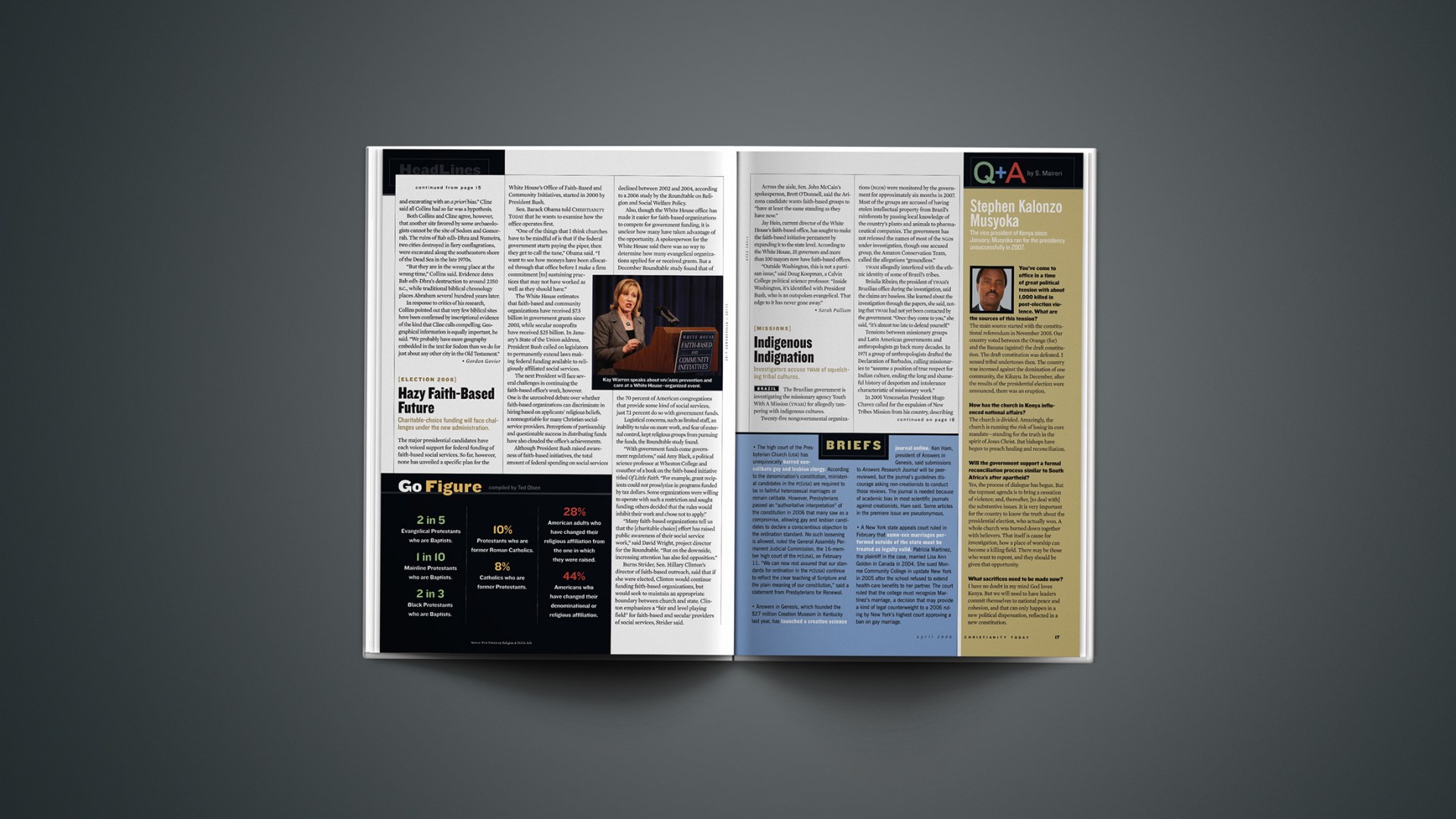The Brazilian government is investigating the missionary agency Youth With A Mission (YWAM) for allegedly tampering with indigenous cultures.
Twenty-five nongovernmental organizations (NGOs) were monitored by the government for approximately six months in 2007. Most of the groups are accused of having stolen intellectual property from Brazil’s rainforests by passing local knowledge of the country’s plants and animals to pharmaceutical companies. The government has not released the names of most of the NGOs under investigation, though one accused group, the Amazon Conservation Team, called the allegations “groundless.”
YWAM allegedly interfered with the ethnic identity of some of Brazil’s tribes.
Bráulia Ribeiro, the president of YWAM’s Brazilian office during the investigation, said the claims are baseless. She learned about the investigation through the papers, she said, noting that YWAM had not yet been contacted by the government. “Once they come to you,” she said, “it’s almost too late to defend yourself.”
Tensions between missionary groups and Latin American governments and anthropologists go back many decades. In 1971 a group of anthropologists drafted the Declaration of Barbados, calling missionaries to “assume a position of true respect for Indian culture, ending the long and shameful history of despotism and intolerance characteristic of missionary work.”
In 2005 Venezuelan President Hugo Chavez called for the expulsion of New Tribes Mission from his country, describing the church-planting and Bible translation agency as an “imperialist infiltration.”
Brazil’s YWAM office is nationally based and almost completely staffed by native Brazilians, so Ribeiro doesn’t believe it would be possible to expel the organization from the country. But she said Brazil might seek to sue YWAM or to arrest its missionaries.
While fear of American hegemony sparks backlash against missionaries, so, too, does genuine concern for the tribes that missionaries work with, said Jack Voelkel, interim president for Latin America Mission. “It’s looked upon as pushing our ways on them,” he said. “[Y]ou could understand why people would be critical.”
According to Ribeiro, the real trouble for YWAM began in 2005, when a hermaphroditic child was born into a tribe with which YWAM was working. Tribal custom demanded that the child be killed, but at the father’s request, YWAM took the child to a hospital where doctors did surgery to align the child to its genetic sex, that of a girl.
YWAM’s action drew considerable criticism, but Ribeiro is mystified by the government’s more recent accusations. “Missionary work among indigenous peoples is the main reason why many tribes are alive today,” she said.
The idea that missionary work could destroy an indigenous culture rests on a “false dichotomy,” said Todd Hartch, a historian at Eastern Kentucky University who studies American missionaries in Latin America. “Any contact with the larger world is going to result in some change,” he said. “Sending an anthropologist to study some group changes their culture. The only alternative is total quarantine.”
According to Voelkel, indigenous groups often seek contact with missionaries, who are known to bring food, medicine, and education to isolated villages. “They certainly don’t want to be taken advantage of,” he said. “[But] they want to take advantage of the good things.”
Brazil has a large Protestant population, and many evangelicals serve in government positions. Some Christians trust the good intentions of the investigation.
“I think it’s very fair that governments are concerned,” said Tania Mendes, a Brazilian who has worked with Compassion International for four years.
Ribeiro admits that some NGOs are not trustworthy. “I know there are lots of other NGOs that are not serious,” she said. “It’s not difficult to find irregularities.”
Brazil’s Amazonian rainforest is home to more than 200 indigenous groups. According to press reports, Brazil’s NGO investigation has been turned over to the National Intelligence Service, the country’s equivalent of the FBI.
As of late February, no charges had been filed against YWAM or any of the other organizations.
Copyright © 2008 Christianity Today. Click for reprint information.
Related Elsewhere:
Previous articles about Brazil are in our full-coverage section.
A YWAM training center in Denver was the scene of a shooting in December.










